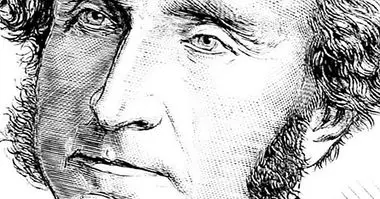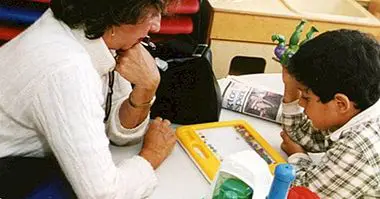Addictive thoughts: how to escape from the loop?
Intuitively, we can think that the best way to avoid relapsing into addictive behavior is to block the thoughts that can lead us to it. It has logic, right? If we do not think about it, we will not be tempted to consume, gamble or watch adult movies on the Internet .
This type of action, often recommended, can achieve, in fact, a short-term success, something that is very encouraging for the addict in rehabilitation and for the people who are supporting him in the process.
In addition, it is very motivating for the person. Makes me feel control That he perceives that he is managing to overcome "his problem". It gives you a sense of accomplishment that is very contagious and tempting and even if you can not suppress all thoughts of consumption. When he does, he lives it (and we live it) as an important advance in his recovery. He is "defeating the enemy", "winning the battle" and other expressions very much in line with the "fight against drugs".
But, unfortunately, what really happens is the opposite.
What you do not have to do to avoid relapse
Separating thoughts about addictive behavior is a terrible idea. A technique not only destined to failure, but in fact, can interfere with recovery.
Addictive thoughts are never random, so the times when they occur are extraordinary opportunities to learn what motivates unwanted behavior.
Any event, circumstance, interaction, thought or feeling that occurs just before, is the key to understanding what it is that seems to be supporting the addictive behavior, why we need it. To move away just at the moment in which it happens is the last thing we must do if we hope to control it .
End the addictive thoughts
Logically, paying attention to an isolated episode of thoughts about consumption or another undesirable habit is not enough to understand what underlies a given addiction. But the more effort we devote to the precipitating circumstances of that addictive thought, the easier it will be to solve the mystery that leads to repeating something we do not consciously want.
Focusing on these first moments in which unwanted thought appears, has an immediate value . Even if precipitating factors do not seem clear, thinking about them creates a very useful separation from the feelings of helplessness that always precede and trigger them. Observing these thoughts, without judging them, and learning about them, is a magnificent antidote to the sense of inevitability that seems to accompany any relapse process.
The suppression of addictive thoughts
Suppressing addictive thoughts is also part of another problem. Addiction is seen as an enemy to beat. Doing so makes the person suffering from the addiction see as uncontrollable something that is part of it reinforcing the feeling of helplessness that we discussed in the previous paragraph.
Trying to suppress these thoughts returns, momentarily, the appearance of control . But it is not possible to change the fact that these thoughts appear at the most unexpected moments.
Instead of thinking in this way, it is much more appropriate to see addiction as a symptom with a specific emotional motivation and purpose. What we must understand to overcome it. Instead of looking the other way, it might be better to learn from it.
The role of willpower in addiction
Working to avoid these uncomfortable thoughts implies rejecting another incorrect and widespread notion; the false and destructive idea, that addiction can be overcome with willpower. This point of view, which has led to think that people can control addiction only by trying harder, is a well-established myth that has led to label people with addiction as "weak" or lacking in "character".
Many people believe that what the addict needs is greater self-control . But in fact, what often prevents an addict from recovering is to rely exclusively on his will.
Relying exclusively on the will makes the addicted person think that we can have an almost immediate solution, without putting too much effort, only proposing it. It is the "addicted mode" of thinking. Control the uncontrollable, is the goal.
The person is mounted a film that, at the beginning, is developed according to the proposed script. But soon it begins to go to its own devices, making the "normality" that the addict wants to appear fall apart and lead to frustration or relapse.
Looking for help against addiction
Only the recognition of the loss of control and the need for professional external help can allow us to begin a long road that leads to recovery.
That is why understanding addiction is an individual process of reconstruction involves dismantling ways of reacting, of developing that the addicted person has learned throughout his life.
Of course, those who suffer from an addiction have willpower. But you must use it to change and build a new life, not to ignore and avoid the previous one. Denying what has led him to a self-destructive lifestyle can, in fact, rush him back to him .
The psychological mechanisms of addiction
Like any other psychological symptom, the addiction arises from emotional issues , largely unconscious and attempts to deal with them. The emotional symptoms, that we all have, can not be handled only through conscious effort.
People with addiction can not stop their symptomatic behavior with their will, as it happens with people with depression, anxiety or phobias. In this, addictions take the prize of social incomprehension towards mental disorders.
Working to overcome an addiction is hard, but it is not about suppressing thoughts. It is a task of observing our most complex feelings, motivations and conflicts, especially in the moments when you go through your head repeating the addictive behavior.
Self-observation is not easy for anyone, and it is even more complicated if our thoughts drive us to do something we would not want to do .
Therefore, it is especially relevant to identify the emotional factors that lead the addicted person to feel helpless, and lead to unwanted mental processes. This can help us find ways to handle them, before the entire process that can lead to a relapse is triggered. It is, in short, not to deny one's own thoughts, but to understand them.



















